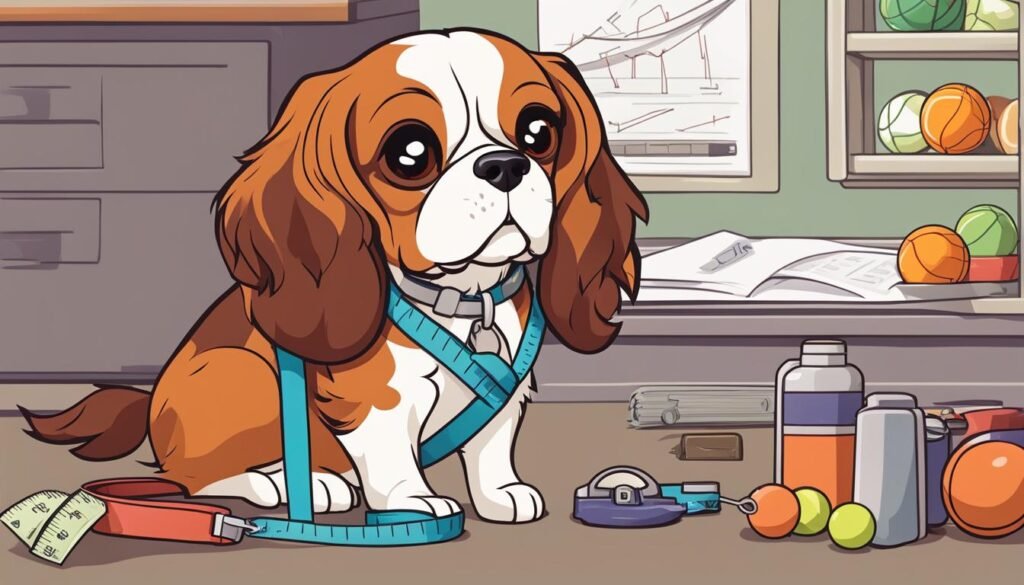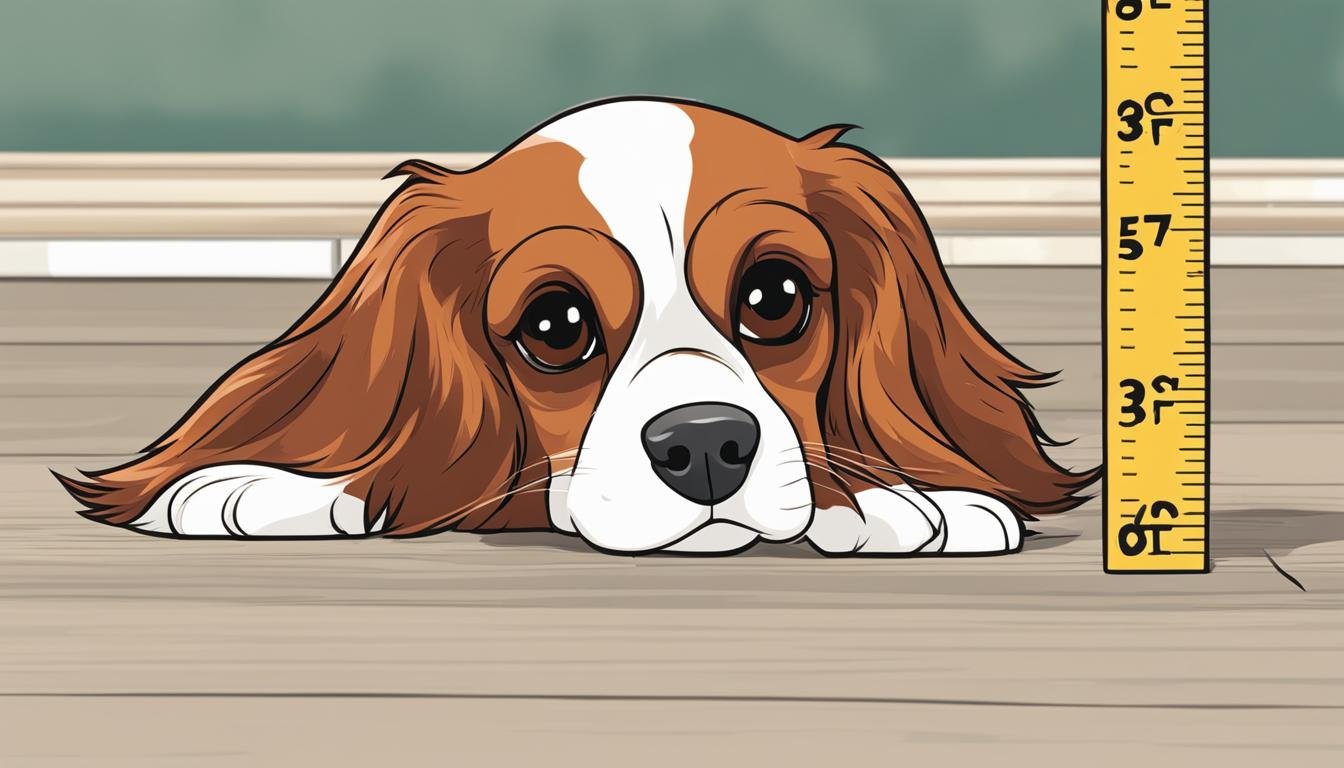If you’ve ever wondered why your Cavalier King Charles Spaniel is on the larger side, you’re not alone. It’s natural to want to understand the reasons behind your furry friend’s size. In this article, we’ll explore the various factors that can contribute to a larger-sized Cavalier King Charles Spaniel and how to manage their size effectively.
Key Takeaways:
- Overfeeding is a common cause of a Cavalier King Charles Spaniel being big.
- Genetics, lack of physical activity, age, and potential medical issues can also play a part in their size.
- Monitor your dog’s weight and ensure it is within the healthy range to prevent health problems.
Factors Influencing Cavalier King Charles Spaniel Size
Understanding the factors that influence the size of a Cavalier King Charles Spaniel is important for managing their weight and overall health. Several factors contribute to their size, including genetics, age, diet, exercise, and potential medical conditions.
Genetics: The size of a Cavalier King Charles Spaniel can be influenced by their genetic makeup. Some dogs may inherit larger-sized genes from their parents, leading to bigger adult dogs. Understanding the breed’s genetic tendencies can help anticipate the potential size of your dog.
Age: Just like humans, Cavalier King Charles Spaniels go through different stages of growth. Puppies are generally smaller and will gradually grow into their adult size. It’s important to provide them with proper nutrition and monitor their growth to ensure healthy development.
Diet and Exercise: The diet and exercise routine of a Cavalier King Charles Spaniel play a significant role in their size. Overfeeding can lead to excessive weight gain, while a lack of physical activity can result in sedentary behaviors and potential weight issues. Providing a balanced diet and regular exercise is crucial for managing their size.
Medical Conditions: Certain medical conditions can also affect the size of a Cavalier King Charles Spaniel. Conditions such as hormonal imbalances or thyroid problems can contribute to excessive weight gain. Regular veterinary check-ups and addressing any potential health issues can help manage their size effectively.
By understanding these factors and taking appropriate measures, you can ensure that your Cavalier King Charles Spaniel maintains a healthy size and weight throughout their life.
Determining if Your Cavalier King Charles Spaniel is Too Big
If you have a Cavalier King Charles Spaniel, you may wonder if it is too big. There are several signs you can look for to determine if your furry friend is overweight. One method is to examine your dog’s body shape. Look for a visible waist, where the chest is larger than the stomach. This indicates a healthy weight. Additionally, you can perform a rib check. Gently feel for your dog’s ribs; if you have to press hard to feel them, your dog may be overweight.
Another sign of an overweight Cavalier King Charles Spaniel is excessive fat deposits. Check for fat pads between the legs and on the hips. If you notice these, it’s a good indicator that your dog is carrying extra weight. Apart from the physical appearance, pay attention to any behavioral changes. If your dog lacks energy, experiences difficulty breathing, or moves slower than usual, it could be a sign of being overweight.
Signs of an Overweight Cavalier King Charles Spaniel:
- Visible absence of waistline
- Rib check requires pressing hard to feel the ribs
- Excessive fat pads between the legs and on the hips
- Behavioral changes like lack of energy, difficulty breathing, and slower movement
Being aware of these signs can help you determine if your Cavalier King Charles Spaniel is too big. If you have any concerns about your dog’s weight, consult with your veterinarian. They can provide guidance on managing your dog’s size and maintaining a healthy weight. Remember, a healthy and fit Cavalier King Charles Spaniel is a happy companion!

Diet: Start by evaluating your dog’s diet and adjusting its food portions as necessary. Avoid overfeeding and opt for high-quality dog food that provides the necessary nutrients without excessive calories. Limit the number of treats and opt for healthier alternatives when rewarding your pet.
Exercise: Regular exercise is crucial for maintaining a healthy weight in Cavalier King Charles Spaniels. Ensure your dog gets plenty of physical activity through daily walks, playtime, and engaging in other activities that promote movement.
Veterinary Guidance: Regular vet check-ups are important to address any medical conditions that may contribute to your dog’s size. Your veterinarian can provide guidance on managing your dog’s weight and recommend appropriate dietary and exercise plans.
Conclusion
In conclusion, there are various factors that contribute to the size of your Cavalier King Charles Spaniel. It can be influenced by genetics, diet, exercise, age, and potential medical issues. By understanding these factors and taking appropriate measures, you can help your dog maintain a healthy weight.
Monitoring your dog’s weight and body shape is crucial in determining if your Cavalier King Charles Spaniel is too big. Look for visible signs of an overweight dog, such as a lack of waist and excessive chest size compared to the stomach. Conduct a rib check to assess your dog’s weight, ensuring that you can feel its ribs without pressing hard.
Managing the size of your Cavalier King Charles Spaniel involves making necessary adjustments to its diet and exercise routine. Provide a balanced and nutritious diet, adjusting food portions to prevent overeating. Limit the number of treats and consider using alternative rewards to control calorie intake. Regular exercise through walks, playtime, and other activities is essential in maintaining a healthy weight.
Remember to seek veterinary guidance and address any potential medical conditions that may contribute to your dog’s size. By prioritizing your Cavalier King Charles Spaniel’s health and taking proactive steps, you can ensure that your furry friend remains happy, healthy, and within the appropriate weight range.
FAQ
Why is my Cavalier King Charles Spaniel so big?
There are several reasons that could contribute to the size of a Cavalier King Charles Spaniel, including overfeeding, genetics, lack of physical activity, age, and potential medical issues.
What factors influence the size of a Cavalier King Charles Spaniel?
The size of a Cavalier King Charles Spaniel is influenced by genetics, age, diet, exercise, environmental and lifestyle factors, as well as potential medical conditions.
How can I determine if my Cavalier King Charles Spaniel is too big?
You can examine your dog’s body shape, perform a rib check to assess weight, look for excessive fat, and observe behavioral changes like lack of energy, difficulty breathing, and slower movement.
How can I manage the size of my Cavalier King Charles Spaniel?
You can manage your dog’s size by adjusting its diet and food portions, switching to high-quality dog food, limiting treats, increasing exercise levels, and seeking veterinary guidance.

